 GENERAL AUDIENCE TODAY
GENERAL AUDIENCE TODAY
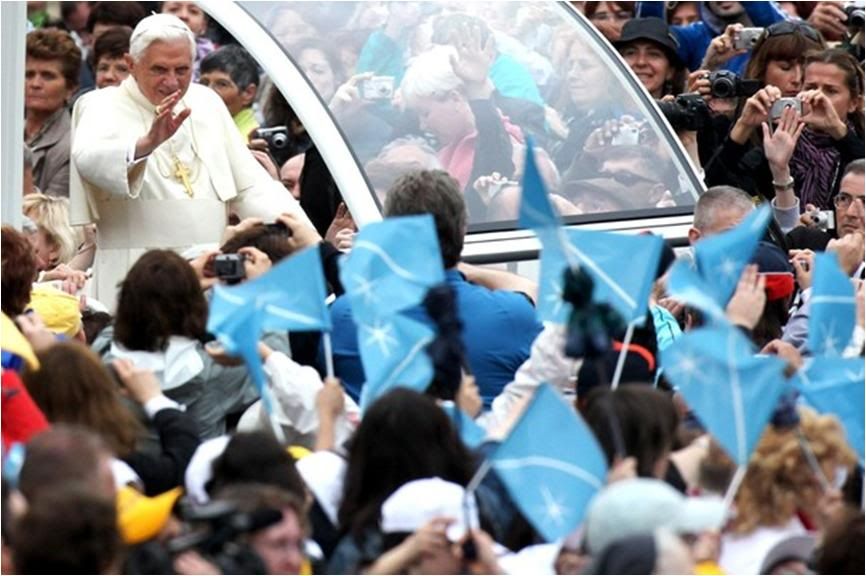
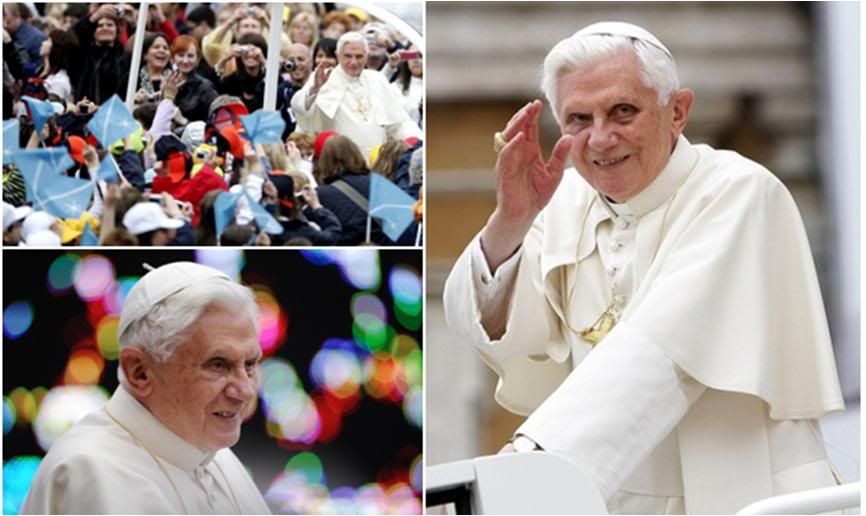 Pope calls on nations to live up to
Pope calls on nations to live up to
nuclear non-proliferation commitment

(05 May 10 - RV) During his General Audience this Wednesday, Pope Benedict XVI made an appeal for a nuclear-free world, told pilgrims that marriage can save society, and warned priests against a weakening of Christ’s action through the Church, when God’s gift of the sacraments are ministered without humility and fidelity.
Twenty thousand pilgrims and visitors packed an overcast St Peter’s Square Wednesday to hear Pope Benedict XVI’s weekly catechises.
Speaking in Italian at the end of the audience the Pope launched an appeal to world leaders gathered in New York for the review conference on the Nuclear Non-Proliferation Treaty, asking them to “overcome the constraints of history and patiently weave a political and economic plan for peace, to help human development and the genuine aspirations of peoples”.
He said: " Progress towards combined and secure nuclear disarmament is closely connected to the full and rapid fulfilment of the relative international commitments... Peace, in fact, rests on trust and on respect for promises made, not only on the balance of power”.
The Pope went on to encourage initiatives “which pursue a progressive disarmament and the establishment of zones free from nuclear weapons, with a view to their complete elimination from the planet”.
Also Wednesday Pope Benedict used his greeting to English speaking pilgrims to launch a strong defence of marriage, which he described as “an instrument of salvation, not only for married people but for the whole of society.”
His comments came in greetings to a group of pilgrims from Jönköping Sweden, where a Conference on the Family will take place later this month.
He observed that: “Like any truly worthwhile goal, it places demands upon us, it challenges us, it calls us to be prepared to sacrifice our own interests for the good of the other. It requires us to exercise tolerance and to offer forgiveness. It invites us to nurture and protect the gift of new life. Those of us fortunate enough to be born into a stable family discover there the first and most fundamental school for virtuous living and the qualities of good citizenship. I encourage all of you in your efforts to promote a proper understanding and appreciation of the inestimable good that marriage and family life offer to human society.”
The Pope added that “God’s gift to us of marriage and family life enables us to experience something of the infinite love that unites the three divine persons – Father, Son and Holy Spirit. Human beings, made in the image and likeness of God, are made for love – indeed at the core of our being, we long to love and to be loved in return. Only God’s love can fully satisfy our deepest needs, and yet through the love of husband and wife, the love of parents and children, the love of siblings for one another, we are offered a foretaste of the boundless love that awaits us in the life to come”.
Earlier, in his catechesis in Italian, the Holy Father had reflected on his weekend trip to Turin to venerate the Holy Shroud: “which invites us to contemplate the face of Christ” and “to share in his saving work”.
But the main body of this week's catechesis was a continuation of his reflections on the priestly ministry, and, in particular the ministry of sanctification:
“As ministers of Christ, priests bring us into life-giving contact with the mystery of God’s holiness... In the celebration of the sacraments, and in particular the Eucharist and the Sacrament of Reconciliation, Christ’s sanctifying work is constantly made present and effective”.
The Pope pointed out that “an under-estimation of the faithful exercise of this ministry has represented a weakening of the current action of Christ through the Church."
“In their devout celebration of the sacraments, priests sanctify the faithful and are themselves sanctified and configured ever more closely to Christ. I ask all of you to pray for priests and their ministry of sanctification, that they may be true shepherds according to God’s heart”.
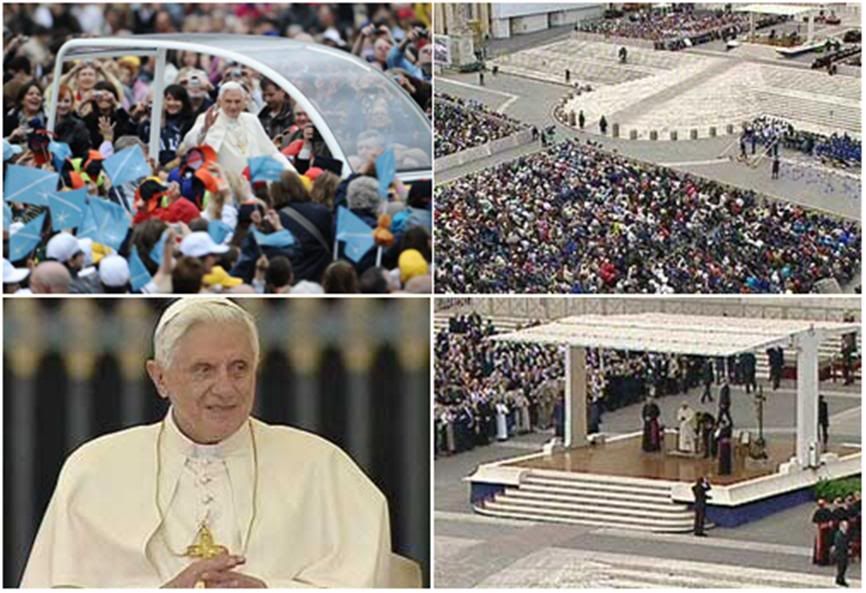
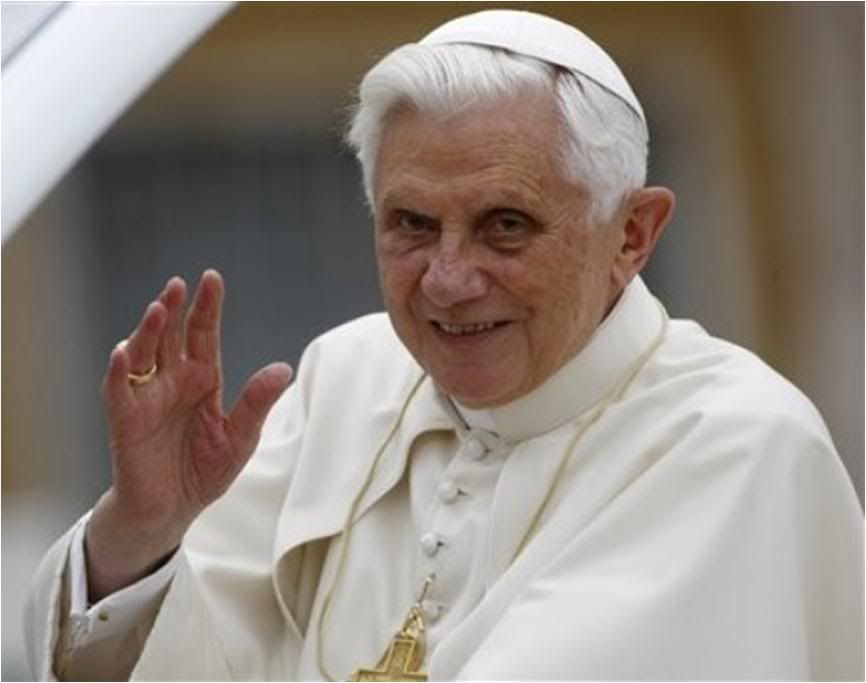
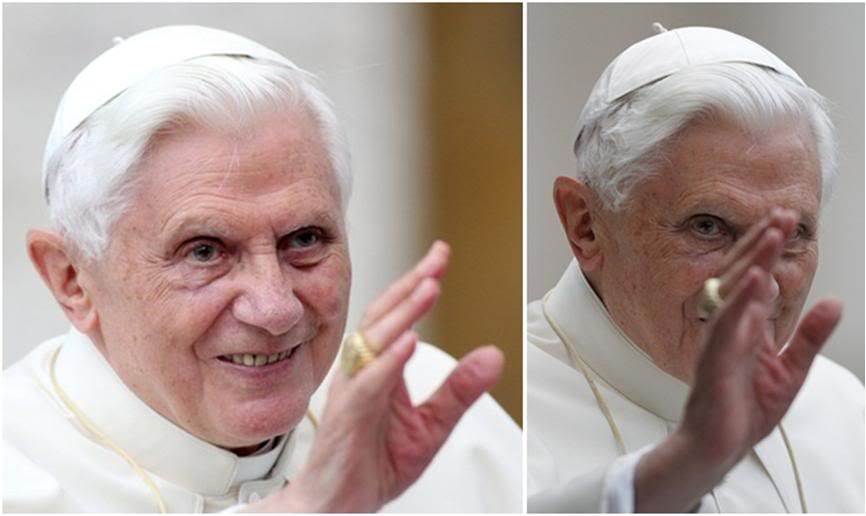
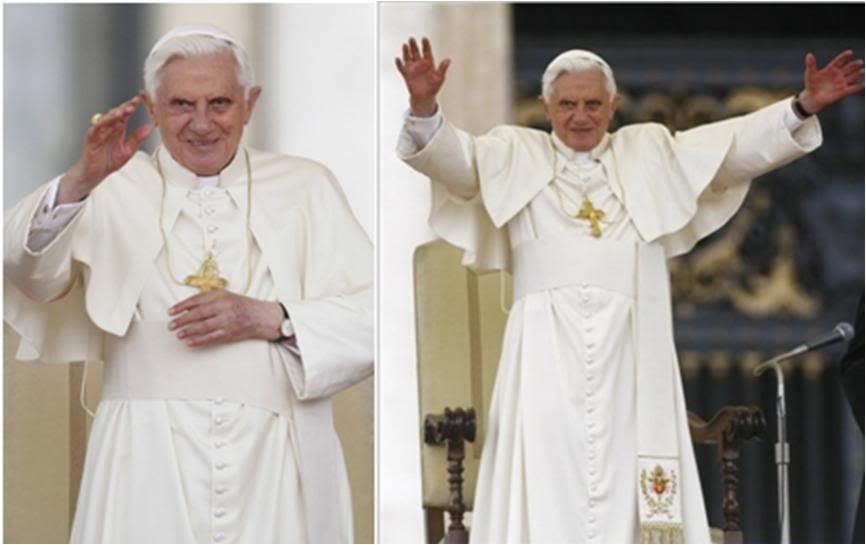
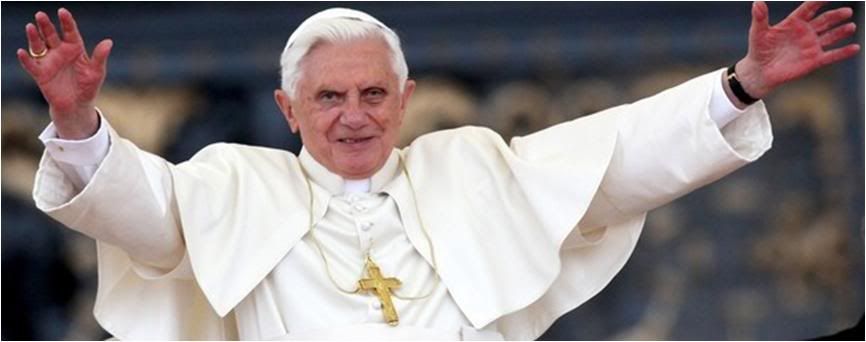
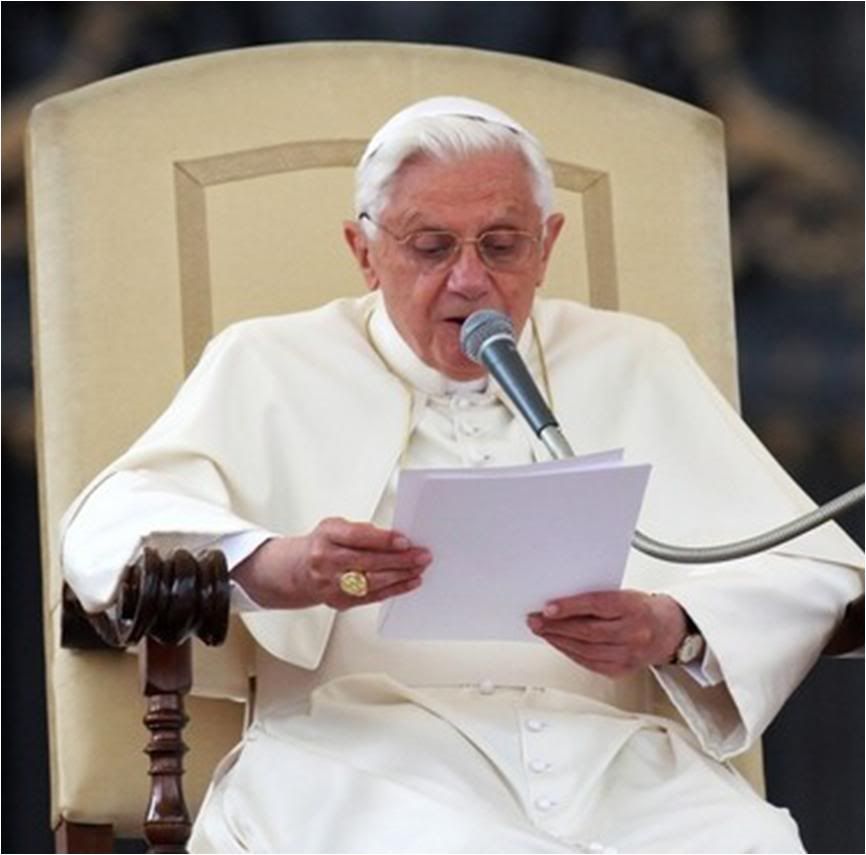 Here is a translation of the Pope's catechesis:
Here is a translation of the Pope's catechesis:
Dear brothers and sisters,
Last Sunday, on my pastoral visit to Turin, I had the joy of pausing in prayer before the Holy Shroud, joining the two million pilgrims who will have comtemplated it for the duration of this exposition.
That sacred cloth can nourish the faith and reinvigorate Christian piety because it urges us to turn to the Face of Christ, to the Body of Christ crucified and risen, to contemplate the Paschal mystery, center of the Christian message.
Of the Body of the risen Christ, who lives and works in history (cfr Rm 12,5), we, dear brothers and sisters, are living members, each according to his own function, namely, with the task that the Lord has entrusted to each of us.
In today's catechesis, I wish to return to the specific tasks of a priest which, according to tradition, are essentially three: to teach, to sanctify, and to govern.
In one of the previous catecheses, I spoke on the first of these missions: teaching, announcing the truth, the announcement of God revealed in Jesus Christ, or - in other words, the prophetic task of putting man in contact with the truth, to holp him recognize what is essential in his life, reality itself.
Today, I wish to dwell briefly with you on the second task that the priest has - to sanctify men, above all through the Sacraments and worship in the Church. We must ask ourselves first, what does the word 'holy' mean?
The answer is: 'holy' is the specific quality of God's being, namely absolute truth, goodness, love, beauty - pure light. To sanctify a person therefore means to put him in contact with God - God as light, truth, pure love.
It is obvious that such contact transforms the person. In antiquity, there was the firm belief that no one could see God without dying right away - so great is the power of truth and light! If man touches this absolute current, he cannot survive.
On the other hand, there was also the conviction that without the least contact with God, man cannot live. Truth, goodness, love are fundamental conditions for his being. The question is: How can man find that contact with God which is fundamental, without dying from being overcome by the grandeur of the divine being?
The faith of the Church tells us that God himself creates this contact, which transforms us gradually into true images of God.
And so we come back to the task of the pirest 'to sanctify'. No man by himself, with his own power, can place another in contact with God. An essential part of the grace of priesthood is the gift, the task, of creating this contact.
This is realized in announcing the Word of God, in which his light comes to us. It is realized in a way that is particularly dense in the Sacraments.
Immersion in the Paschal mystery of death and resurrection takes place in Baptism. it is reinforced at Confirmation and in Reconciliation, it is nourished by the Eucharist - the Sacrament that edifies the Church as the People of God, Body of Christ, Temple of the Holy Spirit (cfr John Paul II, Apost. Exhortation Pastores gregis, No. 32).
It is therefore Christ himself who makes us holy, namely, he draws us into the sphere of God. As an act of his infinite mercy, he calls some to 'be' with him (cfr Mk 3,4) and to become, through the Sacrament of Holy Orders, despite human poverty, participants in his own priesthood, ministers of this sanctification, dispensers of his mysteries, 'bridges' for the encounter with him, for his mediation between God and men, and between men and God (cfr. po,5).
In the last decades, there have been tendencies oriented towards making prevalent - in the identity and the mission of the priest - the dimension of announcement, detaching it from that of sanctification. It is often affirmed that it is necessary to go beyond a ministry that is 'merely' sacramental.
But is it possible to authentically exercise the priestly ministry by 'going beyond' its sacramental function? What does it mean for the priest to evangelize, and what does the so-called primacy of announcement consist of?
As the Gospels say, Jesus affirmed that the announcement of the Kingdom of God was his mission. But this announcement was not merely 'discourse' - it included, at the same time, his actions.
The signs, the miracles, that Jesus worked indicate that the Kingdom is a present reality, and that in the end, it coincides with his own person, with the gift of himself, as we heard today in the Gospel.
The same goes for the ordained ministry: he, the priest, represents Christ, the One sent by the Father. He continues his mission through the 'word' and the 'sacrament', in this totality of body and soul, sign and word.
St. Augustine, in a letter to Bishop Honoratus of Thisbe, affirmed, referring to priests: "They must therefore be servants of Christ, ministers of his word and his sacrament, that which is commanded or allowed" (Epist. 228, 2).
It is necessary to reflect whether, in some cases, undervaluing the faithful exercise of the munus sanctificandi [the duty to sanctify] may not represent a weakening of faith itself in the salvific effectiveness of the Sacraments, and therefore, in the actual working of Christ and his Spirit, through the Church, in the world.
Who therefore saves the world and man? The only answer we can give is - Jesus of Nazareth, Lord and Christ, crucified and risen.
And where is it actualized - the mystery of death and resurrection, which brings salvation? In the action of Christ through the Church, particularly in the Sacrament of the Eucharist, which makes present the redeeming sacrificial offering of the Son of God; in the Sacrament of Reconciliation, in which the death of sin turns into new life; and in every other sacramental act of sanctification (cfr. po, 5).
Therefore it is important to promote a catechesis that is adequate to help the faithful understand the value of the Sacraments, but it is equally necessary, along the exmaple of the Holy Curate of Ars, to be available, generous and attentive in giving our brothers the treasures of grace that God has placed in our hands, and of which we are not 'masters', but custodians and administrators.
Especially in our time, when on the one hand, a profound need and widespread search for spirituality are emerging, it is necessary for every priest to remember that in his mission, missionary announcement and worship and the sacraments must never be separated, and that he must promote a healthy sacramental ministry in order to form the People of God, help them to fully live the Liturgy, worship in church, and the Sacraments as free gifts of God, free and efficacious acts of his saving action.
As I recalled in the Holy Chrismal Mass this year: "At the center of the Church’s worship is the notion of 'sacrament'. This means that it is not primarily we who act, but God comes first to meet us through his action, he looks upon us and he leads us to himself... God touches us through material things... that he takes up into his service, making them instruments of the encounter between us and himself" (Homily, Chrismal Mass, April 1 2010).
The truth according to which in the Sacrament "it is is not primarily we who act" has to do with - and must concern - the consciousness of the priest. Every priest knows well that he is the necessary instrument for God's salvific action, but only the instrument. This consciousness must make him humble and generous in administering the Sacraments, in respecting canonical norms, but also in the profound conviction that his mission is to do everything so that all men, united to Christ, may offer themselves to God as a living and holy host that is pleasing to him (cfr Rm 12,1).
Exemplary in the matter of the primacy of the munus sanctificandi and of the right interpretation of sacramental ministry is, again, St. Jean Marie Vianney, who, one day to a man who said he had no faith and wished to dispute this with him, replied: "Oh my friend, you have addressed the wrong person. I do not know how to reason. But if you have need of some comfort, then go in there" - pointing to the inexorable stool [the confessional] - "where believe me, many others have gone before you, and you will not regret it" (cfr. Monnin A., Il Curato d'Ars. Vita di Gian-Battista-Maria Vianney, vol. i, Torino 1870, pp. 163-164).
Dear priests, live the Liturgy and worship with joy and love - these are actions that the Risen One achieves through the power of the Holy spirit in us, with us and for us.
I wish to renew the invitation to 'return to the confessional' as the place where the Sacrament of Reconciliation is celebrated, but also as a place to 'inhabit' more frequently so that the faithful may find mercy, counsel and comfort, feel himself loved and understood by God, and experience the presence of Divine Mercy alongside the real Presence in the Eucharist" (Address to the Apostolic Penitentiary, March 11, 2010).
I also wish to invite every priest to celebrate and live intensely the Eucharist which is at the heart of the mission to sanctify - it is Jesus who wants to be with us, live in us, give himself, show us the infinite mercy and tenderness of God. It is Christ's unique sacrifice of love that is made present, that is realized among us and reaches to the throne of Grace, to the presence of God, embracing mankind and uniting us to him" (cfr. Address to the Clergy of Rome, Feb. 28, 2010).
And the priest is called to be the minister of this great Mystery, in the Sacrament and in life. If "the great ecclesial tradition has rightly linked the sacramental efficacy of the concrete existential situation of the individual priest, so that the legitimate expectations of the faithful are adequately safeguarded", this does not take away anything "from the necesssary - indeed, indispensable - tension towards moral perfection which should inhabit every heart that is authentically priestly": the People of God rightly expect of their pastors an example of faith and a witness of sacntity. (cfr Benedict XVI, Address to the Plenary Assembly of teh Congregation for the Clergy, March 16, 2009).
It is in the celebration of the Holy Mysteries that the priest finds the root of his sanctification (cfr po, 12-12).
Dear friends, be aware of the great gift that priests are for the Church and for the world. Through their ministry, the Lord continues to save men, to make himself present, to sacntify.
Learn to thank God, and above all, be close to your priests with prayer and with your support, especially in their difficulties, so that they may always be pastors after the heart of God. Thank you.
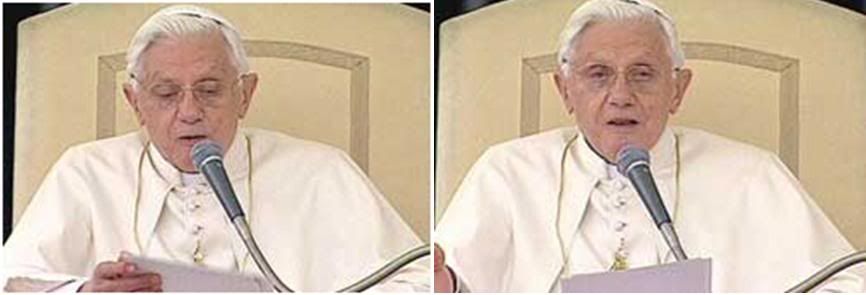
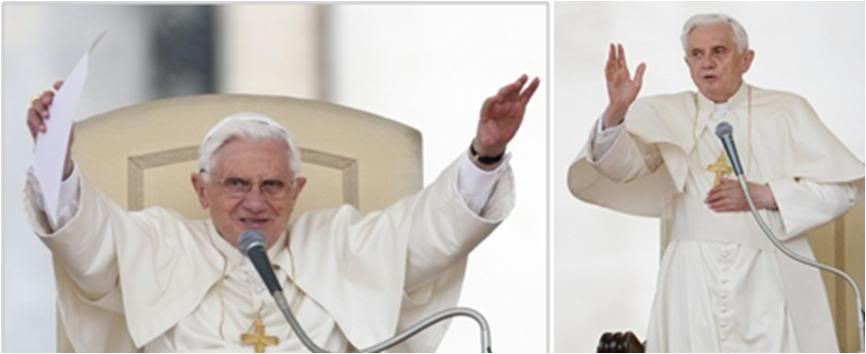
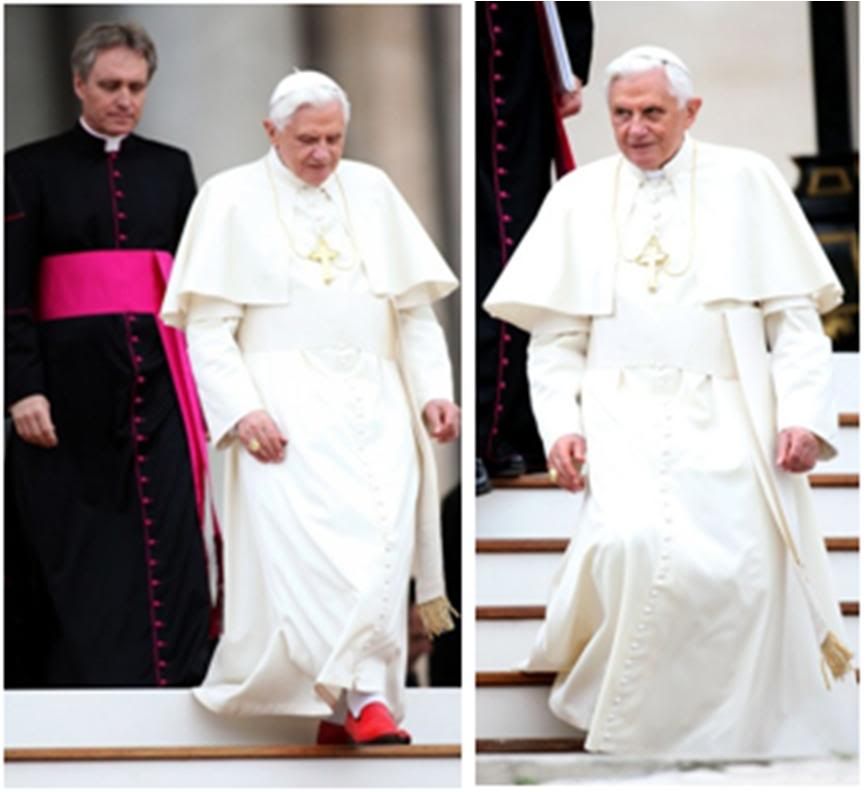
[Modificato da TERESA BENEDETTA 06/05/2010 03:37]